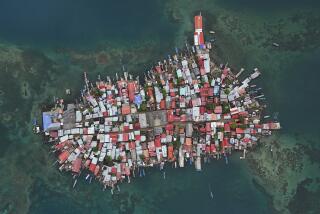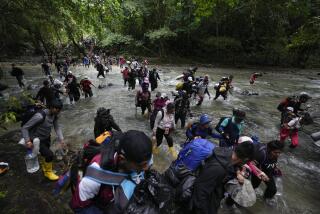Noriega Opens Talks on Crisis but Foes Stay Away
- Share via
PANAMA CITY — The military-dominated government of Panama opened talks Monday aimed at ending the country’s political stalemate, but only supporters of Gen. Manuel A. Noriega showed up.
Called a “national dialogue” by Noriega’s government, but rejected as “a ploy to buy time” by one opposition leader, the talks began as Panama limped back to activity after a long Easter holiday and a series of strikes that had shut down most commerce for two weeks.
Although many stores and businesses in Panama City reopened Monday, it became clear that much of Panama’s trade and industry may not begin operating soon for reasons that are as much economic as political.
Diplomatic sources said that as many as half of the foreign banks that operate in Panama have shut down indefinitely, although that could not be confirmed directly with bankers. Local Panamanian-owned banks remained closed as bankers continued to resist government demands that they renew business on a limited basis.
Shoppers stripped grocery store shelves of basic items such as soap, milk, flour and sugar. The stores were not replacing the products immediately, raising fears that a cash shortage in Panama may soon turn into a shortage of goods.
“The country is simply ceasing to function,” said Ricardo Arias Calderon, head of the Christian Democratic Party, a main opposition force.
Besides the paralysis of many factories and businesses, schools are also closed. The schools and the national university here, which were supposed to open six weeks ago, have been centers of anti-Noriega activity and were shut by government order. Hospitals, meanwhile, are operating with reduced staff because of slowdowns by doctors and hospital workers.
Already badly strained relations between the United States and Panama have deteriorated further after an attempt by Panamanian police to stop a limousine carrying American Ambassador Arthur Davis to his home here Sunday.
In Washington, a State Department spokesman called the incident “harassment.”
The Panamanian government responded Monday by saying that its police, which are part of the nation’s Defense Forces under Noriega’s command, were only trying to protect Davis from carloads of armed men that were following him. Davis routinely travels about Panama City in the company of armed bodyguards in trailing vehicles.
The Panamanian government linked U.S. complaints about the incident to the expected arrival of 1,300 additional American troops beginning today at U.S. military installations in Panama. “We would not like to think that false charges would be made against the Defense Forces to justify an announced invasion of Panama,” said a printed statement from the government.
The United States maintains that its deployment of additional troops is only to protect U.S. lives and interests in Panama.
The rough state of the economy and reduced education and health services reflect the inability of Noriega to return Panama to normalcy. There is no indication that the call to a “national dialogue” has had any healing effect on Panama’s deep political divisions.
The political talks opened at the modernistic government-run convention center across from the Marriott Hotel here. Groups representing the government, pro-Noriega political parties, the Panamanian armed forces, opposition parties, labor unions and the Roman Catholic Church were invited.
Officers in Attendance
But only groups tied in some way or another to the military strongman actually attended. Government officials, led by Commerce Minister Mario Rognoni, appeared at the convention center, as did five officers from the Panama Defense Forces. Leaders of parties that participate in the civilian government, as well as government-affiliated labor unions, also attended.
“We call on parties here to seek a dialogue to find a Panamanian solution to the Panamanian crisis,” said Hector Aleman, a pro-Noriega leader of a government labor federation.
As for the absence of opposition representatives, Rognoni shrugged and said: “You can lead a horse to water, but you can’t make him drink.” The talks originally were proposed by Manuel Solis Palma, the nominal civilian president. In a speech last month, Solis held out the possibility that Noriega would resign after such talks as an inducement for opponents to attend.
The inducement did not work, however. No representatives from opposition groups, including the Civic Crusade, the Christian Democratic Party or any other anti-Noriega parties, participated.
“This is a ploy to buy time,” Christian Democratic leader Arias Calderon declared.
Catholic Church officials also stayed away, although last week Catholic bishops offered to mediate peace talks. The government rejected the offer because the church, when it proposed mediation, also called on Noriega to give up power.
In another development, opponents of Noriega announced plans Monday to renew public demonstrations against the general. The Civic Crusade planned a rally to protest the detention of one of its leaders, Carlos Gonzalez de la Lastra, by Noriega’s police. The police arrested De la Lastra last Monday when they raided the Marriott Hotel, detaining and beating crusade members and foreign journalists alike.
De la Lastra is the only person rounded up during the raid who remains in jail. Even if De la Lastra is released by this morning, crusade leaders say they will demonstrate.
More to Read
Sign up for Essential California
The most important California stories and recommendations in your inbox every morning.
You may occasionally receive promotional content from the Los Angeles Times.










